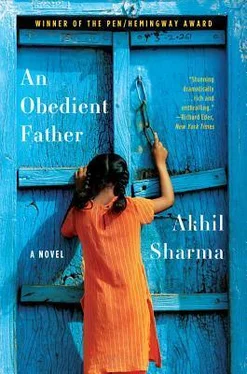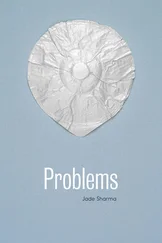I sat across from them. Anita stood near me.
Mr. Maurya explained. There is a small lake in Model Town around which people walk in the morning and after dinner for exercise. In the morning people arrive on scooters and in cars but wearing bathrobes so people might think they live on the lake. Mr. and Mrs. Gupta had just begun their stroll when a police jeep pulled up beside them. Mr. Gupta was handcuffed and hurried into the jeep. When Mrs. Gupta called the police twenty minutes later with the jeep's license plate, she was told there was no such jeep. The kidnappers had phoned and said they wanted ten million rupees.
"I have no money," I told Mr. Maurya.
I knew Congress or whoever he was working for was trying to find out whether I had more money which I hadn't turned over.
"Think of your friend," Mrs. Gupta said. She had a square face and a round body. The brown sari she wore made her appear even smaller than she was.
"She called me," Mr. Maurya said, "because she thought I might be able to help sell her house quickly."
"I swear," I said.
Mrs. Gupta shouted, "The money you have is not yours."
That night Mr. Gupta's body was found in a ditch behind a
school. The kidnappers had spoken with Mrs. Gupta only once, and this convinced me that the murder was not for money but for revenge.
For weeks afterward I had dreams that someone was in my room and was going to kill me. Once, I woke up screaming "Help!" but neither Anita nor Asha came to see what had happened.
Of course, after Mr. Gupta's death, the corruption investigation against him vanished. The form that I had been told to fill out and mail in asked questions such as how I first met Mr. Gupta and whether I had any knowledge of potentially illegal activities in which he might have been involved. After Mr. Gupta's death, I kept the form in my desk for a week, then threw it away. I shivered when I took it out, as if I were picking up a hunk of hair and clotted blood.
Mr. Maurya came to the office one September morning and asked whether I wanted to collect money from Delhi's schools for the BJP Party, which had won Delhi. Without Mr. Gupta, the various groups within the education department, Hindi, English, Science, had begun collecting money separately. Principals were complaining about this. I told him I did not want to collect bribes.
"Why?"
"I'm afraid," I answered, and Mr. Maurya laughed.
When he left, he gave me ten thousand rupees. "A tip," he explained.
K utumn came, short-sleeved shirts during the day and /Nk sleeveless sweaters at night and in the early morning. During the summer, you start to think that everything bad comes from the heat and so begin believing that once the weather changes, the dark thorns in your spit will no longer be there. The temperature drops, yet you have only to rub your face at any time of the day and
a film of grime rolls up onto your fingertips. Living in Delhi is like residing in a coal miner's lung.
The BJP won Delhi, but Congress formed a coalition majority in Parliament. Narasimha Rao, a seat warmer, a turtle of a man, someone who smacks his lips so much that I am sure he wears dentures, became Prime Minister and somehow held on to power because everyone expected him to die and spent their time preparing for that. And because he was so solidly dull, it took us a while to focus on him and discover that he, too, was a shameless thief After he began to implement the World Bank's demands. Parliament members got into fistfights but finally agreed to the proposed budget. The day the BJP officially took control of Delhi, there was a swarm of trucks full of yelling loyalists racing around the city. Rajesh Khanna was shown on TV swaddled in geranium necklaces and was never seen or heard from again.
When I stopped seeing Mr. Gupta's posters, I finally felt that whatever could be resolved had been, and with passing time came a sense of having swindled fate.
Life continued as before. I saw Asha at her school several times a week. I paid Anita two thousand rupees at the start of the month. My weeks were so easy that I wondered whether I was not paying attention. At work, I napped and chatted with Mr. Mishra. When I arrived home, I drank tea and, before the weather changed too much, lay on the common-room floor with the radio.
After the nightly news, Asha continued wanting to hear stories. Because I had no more confessions, I began telling her about my past. I told her how when the king of the region that included Beri died, all the men and boys had to have their heads shaved. I told her about the young student who had lived down the alley from Radha and me when we were just married and who was possessed by a German ghost. Anita would be with us in the common room, listening. She appeared bored most days, and I was not sure whether she listened for entertainment or because she didn't want me to be alone with Asha.
Searching my life for interesting events, I began realizing how
sprawling my years had been. Recounting the past somehow made it more focused, and this, after months of confusion, felt like one more source of wealth. There was a teacher I knew who went to Canada and returned for a holiday with a white woman. He was too cheap to stay in a hotel and they stayed with Radha and me for a week. The white woman was so afraid of getting sick that the only thing she ate was the chocolates that she had brought with her. Once, while the couple was out of the flat, Kusum opened the woman's suitcase and, along with Rajesh and Anita, swallowed five or six large chocolate bars. When the woman returned and discovered what had happened, she wept as though she had learned her mother was dead.
Asha laughed and talked to the characters in my stories while I recounted them. Anita listened silently.
Sometimes Asha would get angry at Anita's quietness. "Why don't you tell me a story?" she asked once.
"I don't have stories."
"Why?" It was obvious by then that Asha resented the difference between my gregariousness and her mother's reticence.
"I haven't lived as long as your grandfather."
"When do you think you'll be old enough to tell a story?"
Anita shrugged. Now that her anger was gone, she often appeared unguarded, crumpled, an abandoned house dissolving into the ground. I was afraid of openly defending Anita because I was afraid any help from me might appear unfair. In a just world I should be the one needing support. Listening to them, I thought that my good fortune had been intended for Anita but had come to me by mistake. The superstitious part of me shivered.
"What's wrong with you?" Asha demanded.
"Don't you love me?" Anita asked.
Occasionally Asha was kind. "I love you most in the world."
I felt that offering Anita comfort directly would be like a thief offering solace to his victim. But I tried giving Anita distractions. I brought home magazines and books. Anita read them, but she had no real interest. She could put a book down in the middle of reading it and only remember to go back when I asked her to tell me its story.
Before, Anita had been curious about current events. Now she no longer read the newspaper. I asked what she thought of Narasimha Rao and she answered, "We have tried idiots and villains as rulers, now we'll try not having a ruler at all." Her anger, therefore, had not vanished, nor her wit, but something had removed the banks through which they coursed and they appeared still.
There were occasions when Anita appeared engaged and happy with Asha. These were rare, but to encourage attempts at them, I bought playing cards. Anita refused to join us.
Anita loved visitors, though. When Rajesh came home, she was so happy that she followed him around the flat. From the concern she showed him — Do you have a heater? How many blankets do you have? — I realized that she was enormously lonely. Rajesh was too suspicious for such attention, though. He would turn her questions upside down and shake them to see if something dangerous might fall out and scuttle across the floor. Then his answer might be "I have enough blankets."
Читать дальше












